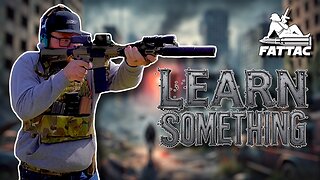Premium Only Content

Shooting From The Hip - 6 - Human Nature Potential
Basic Needs
The original hierarchy of needs 5-stage model:
Abraham Harold Maslow (1908 – 1970) an American psychologist best known for creating Maslow's hierarchy of needs, a theory of psychological health. On fulfilling innate human needs in, culminating in self-actualization.
Maslow stated that people are motivated to achieve certain needs, that some needs take precedence over others.
1. Physiological needs
these are biological requirements for human survival, e.g. air, food, drink, shelter, clothing, warmth, sex, sleep.
If these needs are not satisfied the human body cannot function optimally. Maslow considered physiological needs the most important.
2. Safety needs
once an individual’s physiological needs are satisfied, the needs for security & safety become salient. People want to experience order, predictability & control in their lives. These needs can be fulfilled by the family and society (e.g. police, schools, business & medical care).
For example, emotional security, financial security (e.g. employment, social welfare), law & order, freedom from fear, social stability, property, health and wellbeing (e.g. safety against accidents & injury).
3. Love & belongingness needs
after physiological & safety needs have been fulfilled, the 3rd level of human needs is social & involves feelings of belongingness. Belongingness, refers to a human emotional need for interpersonal relationships, affiliating, connectedness, & being part of a group.
Examples of belongingness needs include friendship, intimacy, trust, & acceptance, receiving & giving affection & love.
4. Esteem
needs are the 4th level in Maslow’s hierarchy & include self-worth, accomplishments & respect. Maslow classified esteem needs into 2 categories:
1) esteem for oneself (dignity, achievement, mastery, independence)
2) the desire for reputation or respect from others (e.g., status, prestige).
Maslow indicated that the need for respect or reputation is most important for children & adolescents & precedes real self-esteem or dignity.
5. Self-actualization
needs are the highest level in Maslow's hierarchy, & refer to the realization of a person's potential, self-fulfillment, seeking personal growth & peak experiences. Maslow describes this level as the desire to accomplish everything that one can, to become the most that one can be.
Edification
noun - the instruction or improvement of a person morally or intellectually. "the idea that art's main purpose is to supply moral uplift & edification" - improvement, instruction, or enlightenment, esp when morally or spiritually uplifting. the act of edifying or state of being edified.
What is an edifying person?
Edifying things uplift people intellectually or morally & help them learn. Good literature, art & music are edifying. The original meaning of edify was "to build," & things that are edifying build up a person, especially in an intellectual or moral way. It's often used in the negative.
What is the life's purpose? Your life purpose consists of the central motivating aims of your life -- the reasons you get up in the morning. Purpose can guide life decisions, influence behavior, shape goals, offer a sense of direction, & create meaning.
Letting go of self-interest & a subjective world view gives you room to discover your true self. Your outer life then can begin to reflect your sense of purpose. It may clash with the society at large.
Self-actualizing or the self-realization or personal transformation which reveals your true self. Your desires, your creativity; your ability to love unconditionally, to empathize with the plight of others & to generously give of yourself. All relate to & inform a life's purpose.
Devote personal energies to serve something larger than yourself. To take responsibility for your own life, by being responsible & receptive. Perhaps even everyone else's life. Live without regard for getting something in return, without reducing or viewing life as a transaction or investment.
Human Nature - The Elements Of Human Nature: Characteristics of all humans
Human nature is a concept that denotes the fundamental dispositions & characteristics -- including ways of thinking, feeling & acting -- that humans are said to have naturally.
I would suggest human behavior & human nature, are different things although directly related: the nature of humans especially: the fundamental dispositions & traits or characteristics of humans are:
1) Intelligence 2) Curious 3) Creative 4) Adaptive 5) Emotional 6) Sexual
These characteristics become central to our behaviors, which are informed by: our social, psychological, familial, societal, ideological, political, religious, philosophical, educational, cultural experiences.
Human behavior
Human behavior refers to the range of behaviors exhibited by humans & which are influenced by culture, attitudes, emotions, values, ethics, authority, rapport, hypnosis, persuasion, coercion &/or genetics.
-
 54:05
54:05
TheGetCanceledPodcast
19 hours ago $13.40 earnedThe GCP Ep.11 | Smack White Talks Smack DVD Vs WorldStar, Battle Rap, Universal Hood Pass & More...
129K20 -
 13:37
13:37
Exploring With Nug
23 hours ago $8.78 earnedSUV Found Underwater Searching For Missing Man Jerry Wilkins!
88.8K4 -
 2:58:21
2:58:21
xBuRnTx
18 hours ago1st Warzone Stream Online
104K11 -
 6:10:21
6:10:21
JdaDelete
1 day ago $23.38 earnedDino Crisis - Sega Saturday
165K6 -
 23:22
23:22
MYLUNCHBREAK CHANNEL PAGE
1 day agoUnder The Necropolis - Pt 5
128K62 -
 2:26:11
2:26:11
Jewels Jones Live ®
2 days agoWINNING BIGLY | A Political Rendezvous - Ep. 108
178K51 -
 2:04:49
2:04:49
Bare Knuckle Fighting Championship
4 days agoBKFC FIGHT NIGHT MOHEGAN SUN FREE FIGHTS
97.2K7 -
 25:09
25:09
BlackDiamondGunsandGear
21 hours agoYou NEED to be Training For Whats to Come
67.6K12 -
 20:03
20:03
Sideserf Cake Studio
1 day ago $2.14 earnedA HUNGRY HUNGRY HIPPOS CAKE THAT ACTUALLY WORKS?
61.1K14 -
 23:51
23:51
marcushouse
1 day ago $2.26 earnedStarship’s Next Move Is Coming Sooner Than You Think!
46.4K7